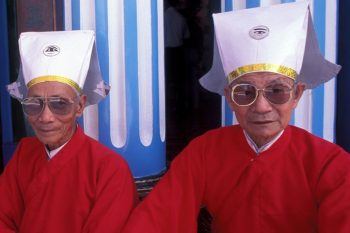Peter Adamson at the TLS:
 In the Indian and Islamic cultures, then, we have what should be uncontroversial examples of sophisticated and long-lasting philosophical traditions. Then there is the culture dearest to Van Norden’s own heart, namely that of China; Baggini also devotes much attention to this, as well as to Japanese philosophy. Though these traditions are arguably not quite as given to the kind of scholastic, dialectical debates so beloved of Indian, Islamic and contemporary analytic philosophers, it seems pretty uncontentious that there is philosophical material here too, notably in the field of ethics with Confucianism and its critics. More open to debate would be the case of various “indigenous” cultures around the world. Neither of our authors ventures far in this direction, though both are optimistic that it would be rewarding to approach traditional African cultures, say, as a repository of philosophical insight. Distinctive methodological challenges arise here, since for indigenous African societies we largely lack traditions of argumentative writing. Work on African philosophy has instead drawn mostly on living oral traditions and on the studies of ethnographers, anthropologists and archaeologists. Similar issues are raised by, among others, Native American, Inuit and Australian aboriginal cultures, and further back in history, ancient Mesoamerica. All of these have, to varying degrees, been subjected to philosophical analysis. For example there is a substantial literature on African conceptions of the person, and on the causal theories underlying the wide range of healing practices found in traditional African societies. Then too, the very notion of locating philosophy in an oral tradition rather than in the writings of brilliant individuals is itself an intriguing one.
In the Indian and Islamic cultures, then, we have what should be uncontroversial examples of sophisticated and long-lasting philosophical traditions. Then there is the culture dearest to Van Norden’s own heart, namely that of China; Baggini also devotes much attention to this, as well as to Japanese philosophy. Though these traditions are arguably not quite as given to the kind of scholastic, dialectical debates so beloved of Indian, Islamic and contemporary analytic philosophers, it seems pretty uncontentious that there is philosophical material here too, notably in the field of ethics with Confucianism and its critics. More open to debate would be the case of various “indigenous” cultures around the world. Neither of our authors ventures far in this direction, though both are optimistic that it would be rewarding to approach traditional African cultures, say, as a repository of philosophical insight. Distinctive methodological challenges arise here, since for indigenous African societies we largely lack traditions of argumentative writing. Work on African philosophy has instead drawn mostly on living oral traditions and on the studies of ethnographers, anthropologists and archaeologists. Similar issues are raised by, among others, Native American, Inuit and Australian aboriginal cultures, and further back in history, ancient Mesoamerica. All of these have, to varying degrees, been subjected to philosophical analysis. For example there is a substantial literature on African conceptions of the person, and on the causal theories underlying the wide range of healing practices found in traditional African societies. Then too, the very notion of locating philosophy in an oral tradition rather than in the writings of brilliant individuals is itself an intriguing one.
more here.
